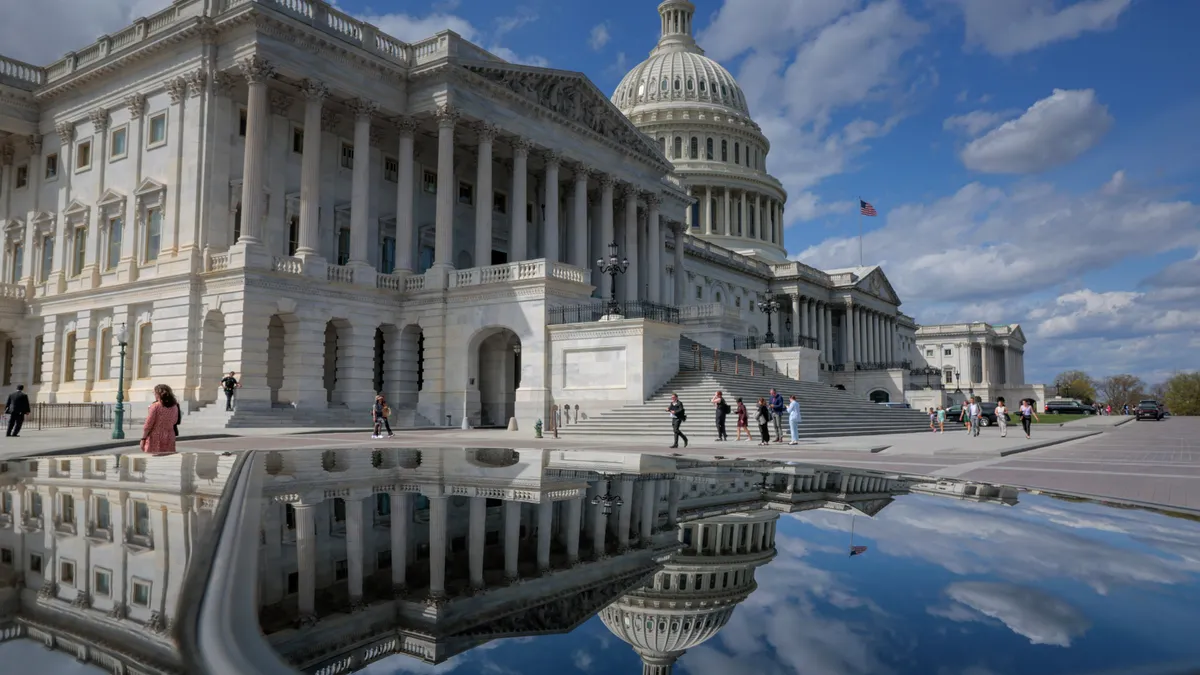UPDATE: April 2, 2025: The House Republican leadership has rescheduled all House votes until April 7 due to a legislative conflict among Republican members. The CRA resolution concerning the CFPB rule is expected to be considered when House business resumes.
Dive Brief:
- The House of Representatives planned to vote Tuesday on a resolution gutting a Consumer Financial Protection Bureau rule giving the agency regulatory authority over large tech companies that offer consumer payment tools. The Senate approved the measure on March 5.
- The White House indicated on the day of the Senate vote that President Donald Trump would sign the resolution, rescinding the bureau’s oversight over companies that process more than 50 million consumer transactions annually. The rule allowing for oversight also called for stiff new penalties in cases of non-compliance. Interest groups representing large retailers and tech companies, including Amazon, Google and Expedia, filed suit earlier this year to block the rule.
- The rule prompted a lawsuit by two industry groups, TechNet and NetChoice – although the CFPB told a federal court on March 21 that it would not enforce the rule as the bureau’s new leaders review policies from the Biden administration.
Dive Insight:
Republicans Sen. Pete Ricketts and Rep. Mike Flood, both of Nebraska, introduced the Congressional Review Act resolution in February, seeking to abolish the CFPB rule.
The legislative review action could make the litigation moot, representatives for TechNet and NetChoice told Payments Dive last month. Collectively, the trade groups represent the interests of more than 135 large companies in the technology, retail and financial industries.
The rule, “Defining Larger Participants of a Market for General-Use Digital Consumer Payment Applications,” took effect in January, giving the CFPB authority to supervise and examine nonbank technology companies that offer peer-to-peer money transfer and digital wallet services, such as Cash App, Google Pay, Apple Pay and PayPal Holdings’ Venmo.
Such tools have become commonplace, the agency said, necessitating the rule. The agency said the new interpretive rule would help to prevent fraud, protect consumers’ privacy and thwart illegal account closures.
The large companies reacted swiftly, viewing the bureau as appropriating sweeping new enforcement authority that allows regulators to scrutinize not just consumer payments but potentially all aspects of their businesses.
Consumer Reports has said that fraud “has become increasingly common on digital payment apps” and that consumers have little recourse if they are scammed.
When the rule was enacted, the agency noted that banks and credit unions that offer similar payments services are already subject to such supervisory authority and examinations by the CFPB.
“If Congress reverses the payment app rule, it will put non-bank payment apps in a regulatory blind spot where their actions go unsupervised and consumers are left with no recourse except to complain to a chatbot,” Adam Rust, director of financial services for the Consumer Federation of America, said Monday in a press release.
“Moreover, passage of a CRA will permanently shield payment apps from oversight, ensuring non-bank payment apps enjoy an impervious and lasting safe space for fraudsters to steal money from people.”
The CRA passed the Senate 51-47 with all Democrats and Missouri Republican Sen. Josh Hawley opposed.
Under the 1996 CRA legislation, if the House and Senate both pass a resolution and the president signs it, an agency rule is rescinded immediately, according to the Library of Congress. The resolution’s passage would also prevent a future CFPB from enacting a rule that is “substantially similar” to the one Congress revoked.














